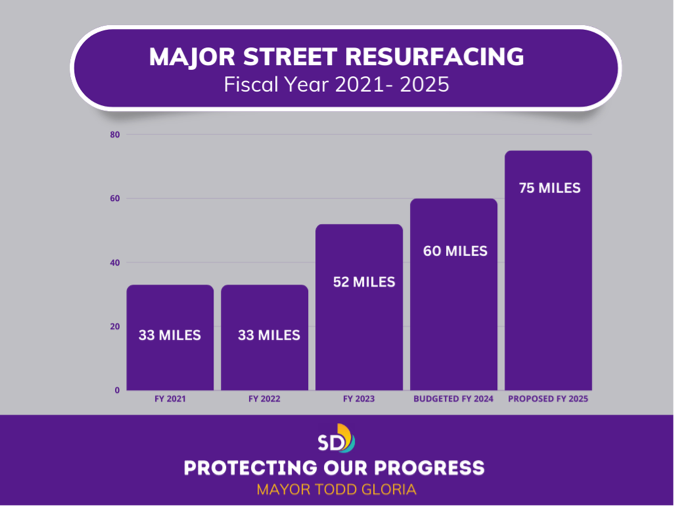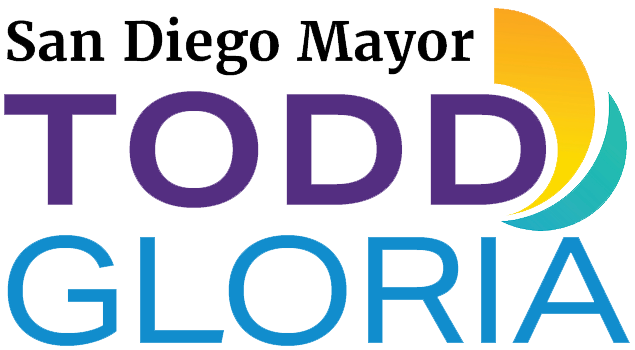Mayor Todd Gloria Signs Fiscal Year 2025 ‘Protecting our Progress’ Budget
FISCALLY RESPONSIBLE BUDGET CONTINUES TO ADDRESS TOP CHALLENGES WHILE MAINTAINING ESSENTIAL CITY SERVICES
FOR IMMEDIATE RELEASE
June 14, 2024
CONTACT:
MayorPress@sandiego.gov
SAN DIEGO – Mayor Todd Gloria today signed into law the Fiscal Year 2025 “Protecting Our Progress” budget that the City Council voted unanimously to approve earlier this week.
The $5.82 billion spending plan maintains essential City services and protects the progress the administration has made over the past three years in addressing homelessness, building more housing, keeping the public safe and fixing roads as well as other critical infrastructure. This is the fourth consecutive year the budget process resulted in unanimous agreement between the Mayor and City Council.
“From the start of the process, my commitment to San Diegans was clear: We will navigate our way through these challenging financial circumstances and protect the progress we have made on our top challenges. Together, we’ve done that,” said Mayor Todd Gloria. “I’m grateful for the partnership with the City Council in delivering this fiscally responsible budget that continues to move our city forward. This budget truly represents our shared vision, hard work, and unwavering dedication to making our city the best it can be.”
“San Diegans rely on the services in this budget, and despite difficult financial headwinds, the City Council came together to protect these programs, and the Mayor ensured their preservation by quickly signing this document into law,” said Councilmember Kent Lee, Chair of the Budget Committee. “I thank my Council colleagues and Mayor Gloria for adopting a final budget that prioritizes housing affordability, homelessness, road repair, and public safety — while also addressing numerous community investments including direct support for flood victims, library and park enhancements, and support for at-risk youth. There is so much more our communities need, and I will continue to work towards the strong financial footing our City requires so that we can make the neighborhood investments San Diegans deserve.”
Despite the City facing a $172 million deficit primarily due to the end of COVID-19 recovery assistance, interest rate hikes, and inflation, the budget avoids major impacts to essential city services such as fire station brownouts and closures or service reductions at libraries, recreation centers and pools. This is thanks in part to early action taken by the Mayor, starting in February, to suspend non-essential spending in City departments, as well as ensuring the City filled only the most critical vacant positions before the end of the fiscal year.
These mitigation actions proved effective in saving money and ultimately necessitating fewer budget cuts. These strategies allowed Mayor Gloria to continue delivering on residents’ key priorities.
Addressing Homelessness and Building More Housing
The approved budget increases funding to address homelessness by approximately $28 million, allowing the City to follow through on two necessary projects that will dramatically boost the number of options to get people experiencing homelessness off the street, out of canyons and riverbeds, and connected to services.
One allocation in the Mayor’s budget is the proposal to turn H Barracks, the City-owned former Navy land adjacent to the San Diego International Airport, into roughly 200 spaces as part of the City’s Safe Parking Program, which provides a safe and legal place for people living in their vehicles to stay overnight. This would nearly double the capacity of this highly successful program, with the potential for adding a Sprung structure in the future, should it become necessary.
The second new allocation is to fulfill the Mayor’s commitment to add 1,000 homeless shelter beds to the City’s homelessness response system. Currently, the Mayor has identified a proposed site for this comprehensive-services facility, located at Kettner Boulevard and Vine Street in Middletown. This would create the City’s largest ever homeless shelter and service campus.
Once these two projects are completed, the City will have more than tripled the number of opportunities for people experiencing homelessness to come off the street end their homelessness. These offerings include shelter, Safe Parking and Safe Sleeping sites.
Preventing and solving homelessness requires building more housing, and the budget supports Mayor Gloria’s efforts to speed up the creation of affordable and middle-income homes near transit by fully funding the personnel needed to review, within 30 days, projects under the Affordable Housing Permit Now and Complete Communities Now programs.
To date, Affordable Housing Permit Now, created by an executive order Mayor Gloria signed in January 2023, has fast-tracked 22 projects, totaling 2,624 new affordable homes, with another 210 in process. Complete Communities Now, created by a second executive order signed this past January, expedites housing projects near transit and was fully implemented in March. As part of that program, eight projects are in process, totaling 602 units.
Fixing Roads and Other Critical Infrastructure
The budget earmarks $104.7 million for street resurfacing construction and design, a significant investment that will increase the number of miles of major street resurfacing from 60 budgeted in the current fiscal year to 75 miles in FY2025 and funds the design and planning needed to complete 105 miles in FY2026.

In April, the City Council was presented with the Gloria administration’s Pavement Management Plan, which uses the most comprehensive assessment ever performed to drive decision-making on street maintenance and investment strategies. This innovative approach allows the City to proactively pinpoint funding needs to prioritize spending.
On stormwater, the budget includes nearly $90 million in funds for flood control and green infrastructure projects. This is in addition to the proactive investments the City has been making under the Water Infrastructure Finance and Innovation Act (WIFIA). Through WIFIA, the City is using the Environmental Protection Agency’s special loan program for water infrastructure projects, covering 49% of up to $733 million in stormwater upgrades, which range from pipeline replacements and pump station repairs to comprehensive watershed restoration.
Keeping San Diego Safe
Mayor Gloria is preserving core service levels in the Police and Fire-Rescue departments by making only minimal reductions to their budgets. This is offset by critical additions, such as funding to cover 12 new positions and operating costs for the Torrey Pines fire station, which will open later this year.
Underscoring the fiscal challenge at hand, fire station brownouts were initially considered during the development of the budget, as were reductions of police neighborhood patrols. The City’s finance team were able to avoid these public safety impacts by identifying reductions elsewhere.
The budget also includes a Fire-Rescue response team in the San Pasqual valley and additional funding to support recently ratified five-year contracts with the City’s Police, Fire-Rescue and Lifeguard unions.
Neighborhood Services
The FY 2025 budget funds parks, libraries and equity programs that support San Diegans’ quality of life, with full funding to keep libraries, recreation centers and pools open and operating at current levels. It provides funding for construction planning for the San Carlos Library, funding for upgrades to Jeremy Henwood Park, and the youth care and development program.
The budget also includes more than $3 million from the Community Equity Fund for the San Diego Housing Commission to use to help victims from the Jan. 22 floods to get back on their feet.
###


